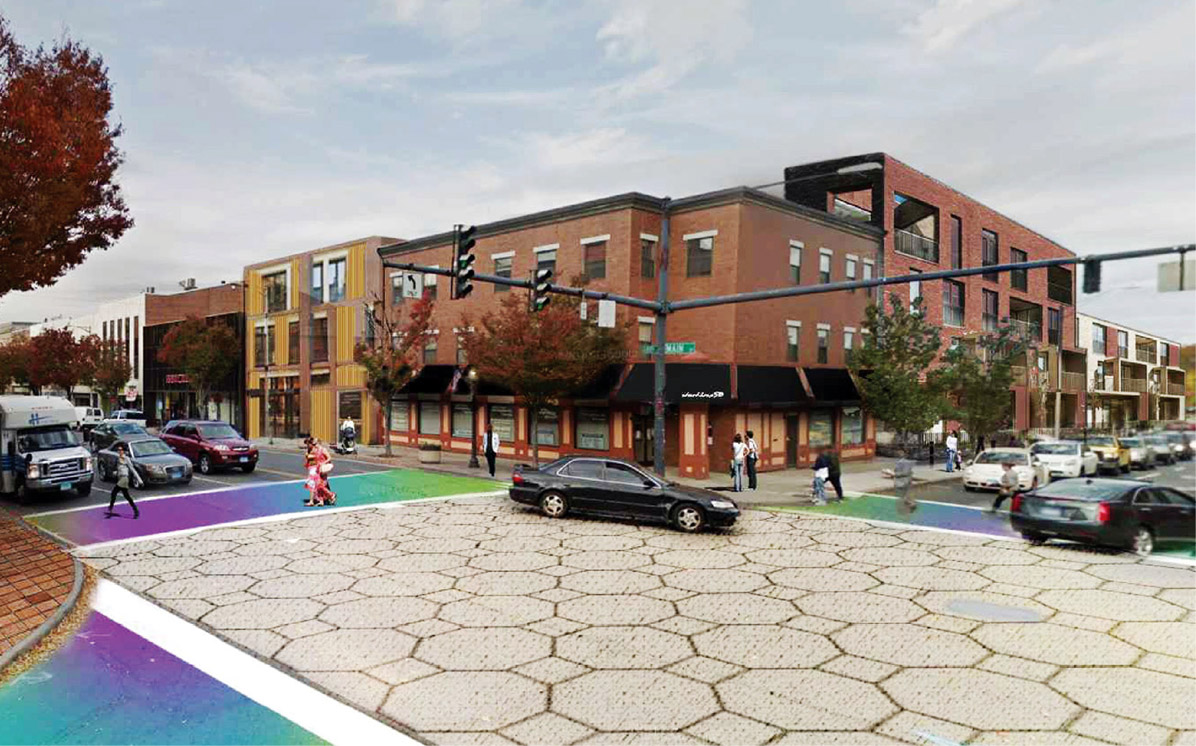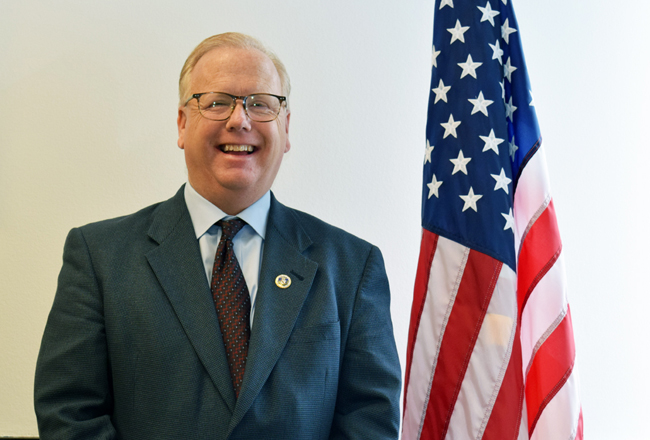
Stamford may be “the place,” according to its marketing materials ”” but, somewhat quietly, Danbury is in the midst of a renaissance that”™s making it a place of note as well.
“We”™re doing it all,” Mayor Mark Boughton told the Business Journal. “The big things and the small things.”
The big things include new businesses ”” over 900 were added last year, Boughton said, “everything from storefronts to corporations. It”™s the highest number we”™ve ever seen and it outpaced the state.”
The mayor identified a reason for the boom: its permitting process is “quick and efficient ”” we work as a partner with the applicant. We”™re not playing ”˜Gotcha!”™ ”
Boughton also touted the Danbury Innovation Center, a business development service that he said “has been a great incubator for people looking to start new businesses,” and business management consultancy SCORE, with which the city has partnered to help budding entrepreneurs develop their business plans.
And a recent DataHaven poll found 83 percent of residents saying they were “satisfied” with living in Danbury, which the mayor said “shows the community is being well-served ”¦ we were really pretty thrilled to see that.”
Danbury also has a relatively low mill rate ”“ 27.6 ”“ and unemployment rate, which as of February stood at 4.1 percent, lower than Bridgeport”™s 6.6 and Norwalk”™s 4.4, and more or less on a par with Stamford”™s 4.0. “There”™s an optimistic feeling to Danbury in terms of the economy and its entrepreneurial spirit,” the mayor declared.

That optimism was maintained in Boughton”™s April 2 budget address to the City Council, which he said was “thoughtful and measured and addresses the needs of the community.” That $261.5 million budget, despite being 1.8 percent, or $4.5 million higher than last year”™s, includes no tax increase ”“ both because the grand list grew by roughly 1.4 percent, or $3.2 million, and because Boughton believes an increase in state taxes is on the way.
Development has also been on the upswing, led by the $17 million acquisition of the Matrix Corporate Center at 39 Old Ridgebury Road, which has stood largely vacant for the past several months, by Southport-based Summit Development. Plans call for a significant redevelopment and renovation program with the result ”” renamed The Ridge at Danbury ”” offering what Summit Founder, CEO, President and Principal Felix Charney said would be the lowest Class A office rents in Fairfield and Westchester counties.
“They”™re still in the infancy of making improvements, but we”™re really excited about what”™s going on there,” Boughton said. “We”™re confident that it”™s going to be something really great.”
Meanwhile, the “Downtown Danbury Transit-Oriented Development Study” released in March provides details on seven locations within a ten-minute walk of the train station at 1 Patriot Drive where improvements to parks, plazas, sidewalks, and intersections would provide “particularly strong benefits in multiple ways including expanding quality transportation choices, promoting economic development, and attracting more people to cultural and recreational destinations.”
Highlighted is the proposed $27 million Danbury Transit Center, which would create a transit hub by combining bus and train service in one location, the TOD represents a “roadmap of what downtown could be,” the mayor said, “and we”™ve found that people like to be downtown.”
As proof, Boughton pointed to the 374-unit luxury apartment complex at 1 Kennedy Flats, constructed in 2016, which he said is 95 percent occupied. Another 150 apartments are scheduled to be constructed across the street at 333 Main St.
Betsy Paynter, executive director of redevelopment agency CityCenter Danbury, said to help beautify downtown the city initiated a competitive grant program to match façade upgrades with up to $10,000.
“It can be everything from power washing historic buildings to window replacements,” she said, noting that the city and its economic development department got input from various architects and residents to put the plan in motion.
Paynter further noted that Danbury provides a number of incentives aimed at making development more economically feasible, from reduced permit fees, expedited application processing and a regulatory structure that relaxes parking requirements in certain areas of the downtown, to the deferral of tax assessment increases for new development for specific uses.
The city is also using a $2 million state grant to improve its streetscape environment making it conducive to pedestrian activity, also with the goal of increasing economic and community development.
Also being touted is Danbury”™s Opportunity Zone. The city, along with the nonprofit Connecticut Economic Resource Center and law firm Pullman & Comley, hosted an informational event Jan. 23 at the Palace Theater to provide background and analysis of the new program, which Paynter said drew “lots of interest and sparked a lot of conversation in downtown,” although nothing has been signed yet.
Awaiting its fate is Tuxedo Junction, the long-vacant former concert facility in downtown at 3 Post Office St. The city put out a request for proposals last fall. Paynter said those proposals are under review.
Another project whose future is yet to be determined is a possible expansion at Danbury Fair Mall, which at nearly 1.3 million square feet is the county”™s largest. Boughton confirmed that anchor tenant Macy”™s is considering expanding two of its pads there ”” one would result in a single-level wing of 37,000 square feet while the other would involve a separate building on an access drive that would total 22,000 square feet.
The mall is a prime attraction for shoppers from nearby New York.
That could change if tolls return to Connecticut, an idea that Gov. Ned Lamont and other state Democrats have supported. “About 50 percent of the mall”™s traffic is from eastern New York state,” the mayor said. “Eastern New York”™s and western Connecticut”™s economies are linked.”
However, he noted, no final decision has been made on where toll gantries could be placed. “The devil will be in the details.”
A Republican, Boughton spoke favorably of Lamont ”” “He puts things out on the table and is willing to learn and collaborate, which is a different style than Gov. (Dannel) Malloy had” ”” but underscored that tolls, taxes and the like “could hurt us.”
Boughton is running for his 10th term as Danbury mayor this November, having usually received 60 to 70 percent or more of the vote each time except in 2015, when he ran unopposed, and in his first try in 2001, when he squeaked by opponent Christopher Setaro by a 49.75 percent to 48.8 percent difference ”” less than 140 votes.
Setaro, an attorney and former City Council member, was endorsed by the Danbury Democratic Town Committee in February to run again this year.
“Danbury has made significant gains over the past 18 years,” Setaro told the Business Journal, “but I believe we need a new plan to manage that growth.”
Noting that the city”™s population has grown by 10,000 since 2000 ”” it stood at 85,246 in 2017 ”” and that the Connecticut State Data Center estimates it will reach nearly 95,000 by 2040, Setaro said new ideas will be needed to confront its “overcrowded schools and overburdened roads.”
Setaro said that while he applauded the TOD”™s recommendations for downtown, “We”™ve been hearing for as long as I can remember how they want to revitalize Danbury and the downtown area. And we”™re still just talking about it after 18 years. We need a more aggressive approach.”
Setaro added that as a small business owner ”” the Setaro Law Firm has six employees ”” he can bring a point of view to the mayor”™s office that Boughton, who began his political career in 1998 as a 34-year-old state representative for the 138th District, cannot.
A three-time candidate for governor, Boughton said he was no longer interested in running for that office.
“I gave it my all and have no regrets,” he said. “The time and energy involved there comes at an incredible cost.”





















